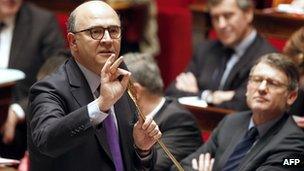Euro rises as finance ministers meet
- Published

French Finance Minister Pierre Moscovici has expressed fears about the strength of the euro
The euro has jumped against the British pound and the Japanese yen.
The move comes as France voiced its concerns about the strength of the euro at a meeting of eurozone finance ministers in Brussels.
But the new head of the eurozone bloc, Jeroen Dijsselbloem, said the currency "was not discussed at great length".
The euro has risen by 6% against a basket of other currencies in the past six months.
But with other countries also wanting to weaken their exchange rates, there are renewed fears of "currency wars".
Japan has recently moved to force down the value of the yen.
Speaking after the meeting, Eurogroup head Mr Dijsselbloem said the euro was talked about. "It was part of the discussion but the main conclusion was that it should be discussed, if anywhere, at the G20 later this week," he added.
'Co-ordinated approach'
On Monday, the single currency rose 1.1% against the yen to 125.30. Against the pound, it climbed 1% to 85.41p. It climbed slightly against the dollar to $1.3387.
"We will have a debate about exchange rates," Mr Moscovici told reporters as he arrived for the meetings.
"The euro has appreciated strongly in recent months... for positive reasons, because confidence is coming back in the eurozone."
He added: "I think that we must, at the international level, argue for a co-ordinated approach that will allow us to have a stable exchange rate... exchange rates should not be subject to moods or speculation,".
Last week, France called for the European Central Bank (ECB) to consider setting a target for the single currency - steering it lower when the value became too high.
But both Germany and the ECB are against such a move, arguing that the central bank's mandate is to ensure price stability and not to manage currency markets.
However, ECB President Mario Draghi was widely thought to be trying to talk down the euro at his interest rate press conference last week.
"The exchange rate is not a policy target, but it is important for growth and price stability," Mr Draghi said in response to a question.
"We will closely monitor money market developments."
Daragh Maher, a senior currency strategist at HSBC, told the BBC that France was probably more "twitchy" because numbers were showing its competitiveness to be declining.
There are reports that the G7 group of rich countries may release a statement later this week to cool talk about currency markets. It is thought that it will reaffirm its commitment to market-determined exchange rates.
Today's Eurogroup meeting - attended by eurozone finance ministers - is the first to be hosted by the Netherlands. Financial aid to Greece and Cyprus is also likely to be discussed.
- Published8 February 2013
- Published7 February 2013